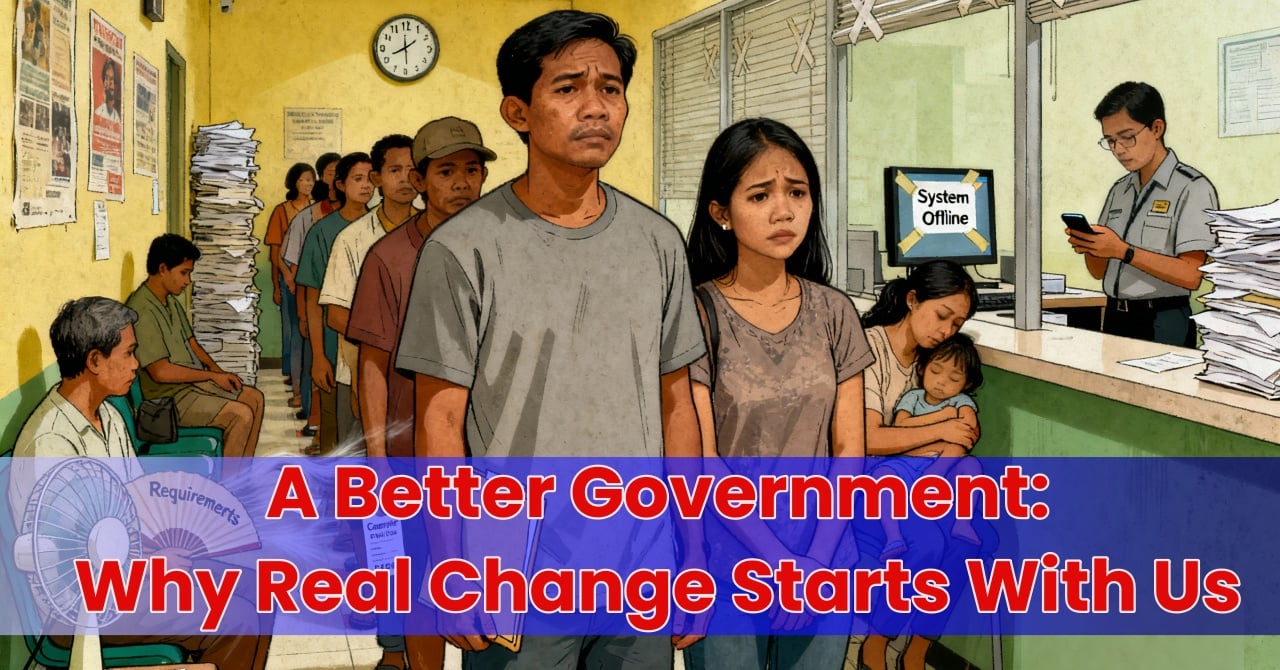We’ve all been there. You line up before sunrise, bring every possible document, and still end up waiting for hours. You skip lunch so you don’t lose your place. You smile at the counter, only to be met with a blank stare—or worse, a sigh.
PesoWeekly’s viral post captured it perfectly: “We pay taxes. We pay fees. So why do we have to beg for service?”
These lines hit because they’re true. The daily struggle to get a simple government service—an ID, a permit, a form—feels like a test of endurance rather than a public right. But while this anger is valid, it also points to a deeper truth: systems don’t change just because we complain. They change when we demand—and model—better.

The everyday struggle Filipinos know too well
Ask anyone who’s ever dealt with a government office, and you’ll hear the same sigh before the story even begins. The complaints have become so common that they almost feel like a national ritual:
- You line up early, but the counters open late.
- You bring every requirement, only to be told one document is missing.
- You’re told the system is online, but the website is “temporarily offline.”
- You pay “computer fees,” yet end up filling out every form by hand.
- You watch ten service windows, but only two are working.
- You’re sent to another building, just to make a photocopy that costs five pesos.
They sound like small frustrations, but together, they paint a bigger picture of how inefficiency chips away at dignity. Every delay, every shrug, every “balik na lang bukas” adds to the quiet exhaustion of citizens who only want what they’ve already paid for—decent, timely, and respectful service.
A culture built on low expectations
Somewhere along the way, “Ganun talaga” became the national shrug.
We say it when things go wrong, when lines get long, when the process is broken. It’s a phrase that excuses failure instead of challenging it.
But every time we say “Ganun talaga,” we accept inefficiency as normal. We let disrespect slide. We make corruption easier to hide behind slow service and complicated systems.
The real issue isn’t just inefficiency—it’s learned helplessness. We’ve been conditioned to expect little, so we settle for less.
The uncomfortable truth: the system mirrors us
Government workers don’t appear out of thin air—they come from the same communities we do. The same classrooms, the same barangays, the same social habits.
So when we see disrespect at the counter or apathy in the service line, it reflects something larger: a national habit of disengagement.
We complain, but we rarely report. We suffer in silence, but we don’t organize. We mock fixers, but some still use them “to save time.”
If we want systemic change, we need cultural change first. That means demanding accountability without entitlement, and participation without cynicism.
What real civic responsibility looks like
Change begins with small, consistent actions that build a culture of accountability from the ground up:
- Report misconduct, don’t just rant about it.
Use official hotlines or feedback forms. Documentation creates data, and data creates reform. - Reward good service publicly.
Acknowledge clerks and employees who go beyond what’s required. Positive reinforcement builds pride in public service. - Refuse shortcuts.
Fixers thrive on frustration. Every time we pay one, we prove that corruption works faster than honesty. - Stay informed.
Understand your rights as a taxpayer and citizen. Read, verify, and share reliable information—not just viral outrage. - Vote with intention.
Choose leaders who value systems, not slogans. Hold them accountable long after election season ends.
Why this matters
Other countries treat taxpayers like clients. Here, as PesoWeekly said, “we’re treated like interruptions.” But that doesn’t have to be our story forever.
The Philippines is not lacking in intelligence or hard work—we’re lacking in collective insistence. If millions of us demanded dignity, transparency, and digital efficiency in unison, no system could ignore it.
It’s easy to say “the system is broken.” But maybe, as one post pointed out, “it’s designed to make you pay a fixer.” And if that’s true, then real change means dismantling not just bad policies—but bad habits, too.
Proof that change is possible
It’s easy to think “nothing ever changes,” but that’s not entirely true. Across the country, there are pockets of reform quietly proving that small improvements can ripple outward.
In Quezon City, some barangay halls now issue business permits in a single visit through streamlined e-governance systems.
In Iloilo, local government offices introduced feedback kiosks that allow citizens to rate public service performance instantly.
In Valenzuela, a digitized document tracking system cut waiting times for birth certificates and clearances from hours to minutes.
These examples didn’t happen by magic. They happened because local officials were pushed—and supported—by citizens who showed up, followed up, and refused to accept “balik na lang bukas” as a permanent policy.
Progress doesn’t always make headlines, but it happens wherever ordinary people keep showing up with patience and principle.
The bottom line
Public service is not a favor. It’s a duty funded by every peso we pay.
But reform doesn’t start at the top—it begins at the counter, in the line, in the choices we make every day.
We can demand better service only when we also become better citizens—critical, compassionate, and unwilling to accept “Ganun talaga” as the end of every story.
Because the moment we stop normalizing inefficiency and start modeling integrity, the system has no choice but to follow.
